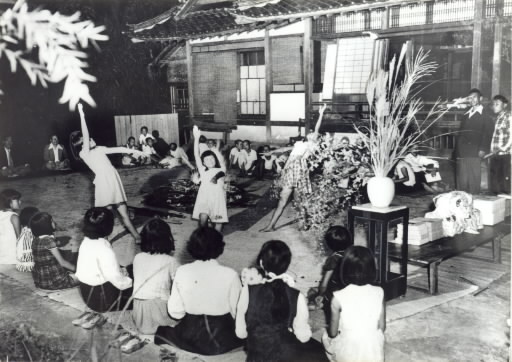The "Moral Adoption" of Hiroshima’s A-bomb Orphans, Part I [4]
Feb. 1, 2009
Children's eyes are opened to a different culture
by Akira Tashiro and Masami Nishimoto, Staff Reporters
Around 1950, the United States was the most affluent country in the world, while Japan was still suffering the deep scars of war. The references to daily life in the letters exchanged between the American “moral parents” and the children in the Hiroshima War Orphans Foster Home highlighted the gap in living standards and lifestyles between the U.S. and Japan. A moral mother in California wrote to her 14-year-old Japanese daughter about American boys and girls:
“Your sister, Pat, has just gone out on what we call a ‘progressive dinner.’ Her club is giving it. They start at one house where they have appetizers, then go to another house (of one of the members of the club, of course) and have salad, then they drive to another house and have the main course, and they are coming to our house for dessert. Doesn’t that sound like a lot of fun? There will be about 30 people.” [By a housewife, on March 16, 1952]
By 1952, the supply of food in Japan had changed slightly for the better, compared to when the Hiroshima War Orphans Foster Home was first opened and had to buy rice on the black market to stave off hunger. Still, the bellies of the 100 growing children in the home were far from being filled. The America that the woman in California described in her letter was inconceivable to the Japanese girl and the other orphans.
A letter by a 15-year-old boy to his mother in California, who was a high school teacher, also conveyed the difference in living standards back then between the U.S. and Japan:
“It’s great that you have a television set to see baseball games at home. We don’t have a television set, so we listened to the U.S. World Series on a radio. I like the Giants. It’s too bad the Giants lost the World Series to the Yankees.” [By a third-year junior high school student, on November 13, 1951]
When summer vacation began in the U.S., many moral parents, while traveling, sent postcards or wrote letters to their children to talk about how they were enjoying camping in the wilderness or how they were driving thousands of kilometers by car.
“We have been up in Wisconsin since vacation started at Lake Gilbert. I expect you like your vacation as much as my children do. They keep wishing you could visit them at the lake and they could show you how they fish and hunt for turtles and run through the woods. Carol is eight years old and disappointed not to have you here.” [By a housewife, on August 8, 1952]
Camping by a lake, fishing, taking a walk in the woods. Children at the Hiroshima War Orphans Foster Home came to sense “affluent America” through the letters from their moral parents. The letters also attracted their interest and fostered their dreams for the country with a different culture from their own. Covering a broad range of topics, the letters mentioned such aspects of American culture as religious holidays, like Easter and Thanksgiving, music, theater, the dating habits of young people, and presidential elections.
This is an excerpt of a letter written by a 14-year-old boy to his moral parents in Ohio:
“I learned in my social studies class that America has an advanced culture and has made a lot of progress in science. I guess the U.S. presidential campaign is now in full swing. We’re very interested in who will be your next president.” [By a second-year junior high school student, on March 15, 1952]
A 16-year-old boy shared a dream with his father in Pennsylvania:
“When I look at the photo you sent, my heart soars. I look forward to the day I can play baseball and tennis with many friends at this large playground.” [By a first-year high school student, on April 27, 1951]
The deeper these children became engaged in communicating with their moral parents, the more they developed a longing for life in America. This was naturally a very different experience compared to Japanese children growing up with their real parents.
Keywords
Breakdown of moral parents
According to statistics furnished by the City of Hiroshima, as of the end of February 1954, there were 270 moral parents except for those registered at the Hiroshima Peace Center in New York. Of these 270 moral parents, 37 were groups. By state, California ranked first with 41 moral parents, while other moral parents lived in 36 states, from Alaska in the north to Florida in the south.
(Originally published on July 17, 1988)








